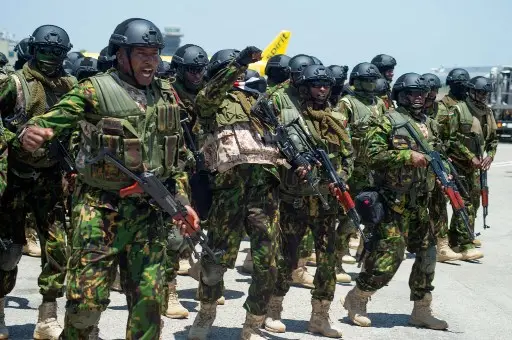As Haiti grapples with an unrelenting wave of gang violence, international support continues to trickle in, with 83 soldiers from Guatemala and El Salvador joining the effort on Friday. Their arrival, confirmed by deputy police spokesman Lionel Lazarre, forms part of a Kenyan-led multinational mission aimed at restoring order in the embattled Caribbean nation.
The newly arrived troops add to a growing force that began deploying in June last year, now comprising around 400 personnel, primarily Kenyan, but also including contingents from Jamaica, Belize, and other nations. Despite plans to expand the mission to 2,500 officers, the force remains critically under-resourced.
Gangs Tighten Their Grip on Port-au-Prince
With an estimated 85% of Port-au-Prince under gang control, the crisis has deepened, leading to devastating consequences for the population. The gangs, notorious for their brutal tactics, have been linked to widespread murder, kidnappings, and sexual violence.
In December alone, violence escalated dramatically. More than 200 people were reportedly killed in a targeted campaign against voodoo practitioners, allegedly orchestrated by a gang leader. Around the same time, commercial flights at the capital’s airport were suspended due to nearby gunfire, underscoring the pervasive instability.
The death toll continues to rise. On December 24, two journalists covering a hospital reopening and a police officer lost their lives in a gunfight with gang members. Such incidents highlight the precariousness of life in Haiti’s capital.
Calls for Stronger Action
In the face of such overwhelming challenges, Haiti’s transitional government has urged the United Nations to elevate the current Kenyan-led mission into a robust peacekeeping operation. However, the proposal has encountered resistance at the UN Security Council, where both China and Russia have expressed opposition, complicating the path forward.
A Fragile Glimmer of Hope
Despite the dire situation, international support remains a crucial lifeline. The deployment of additional troops, including the recently arrived Guatemalan and Salvadoran soldiers, signals continued global recognition of Haiti’s plight. Yet, the effectiveness of the mission hinges on its ability to overcome logistical constraints and secure broader international backing.
For the Haitian people, the stakes could not be higher. As armed groups tighten their grip on the capital, the question looms: will international intervention be enough to restore stability to a nation teetering on the brink?

